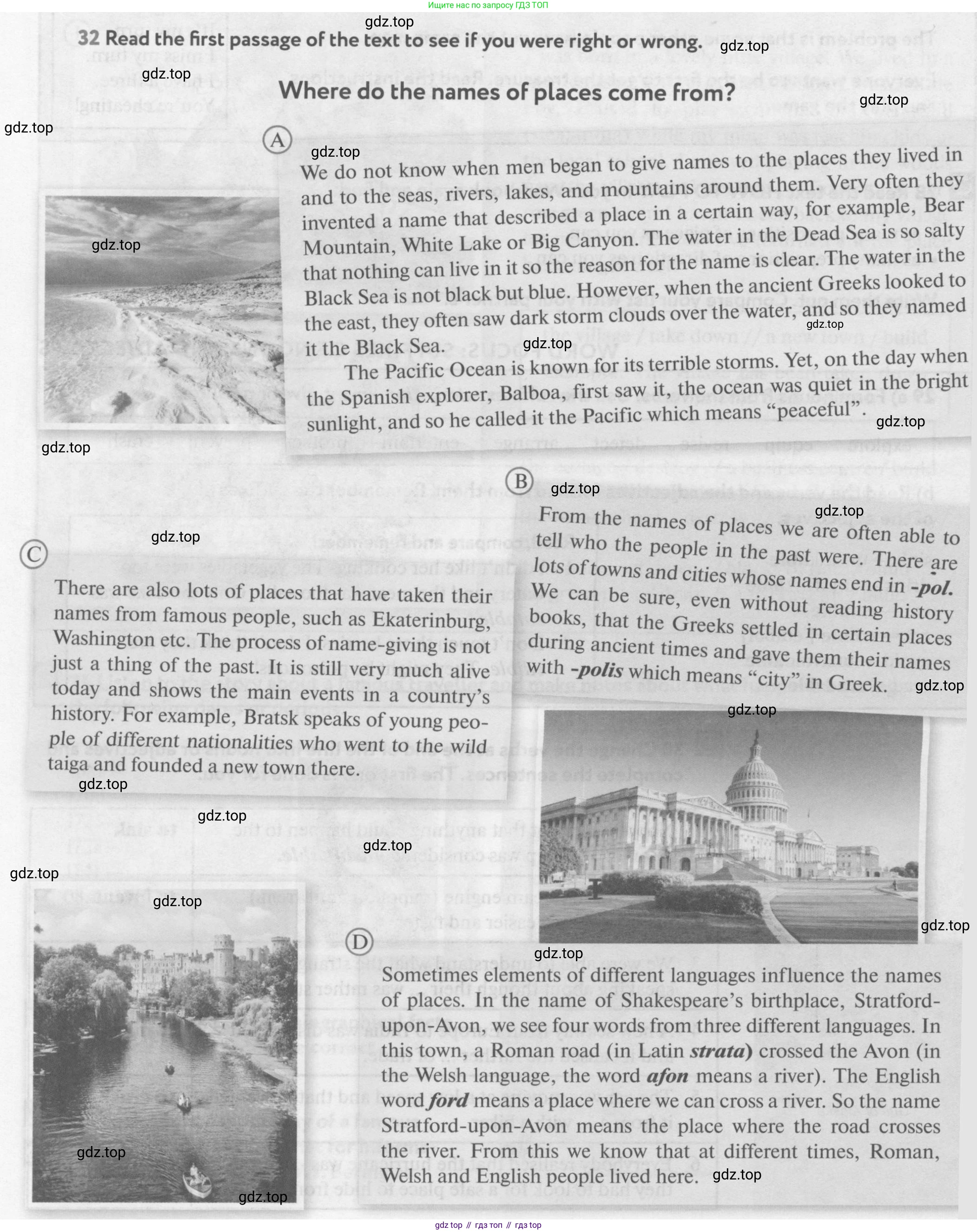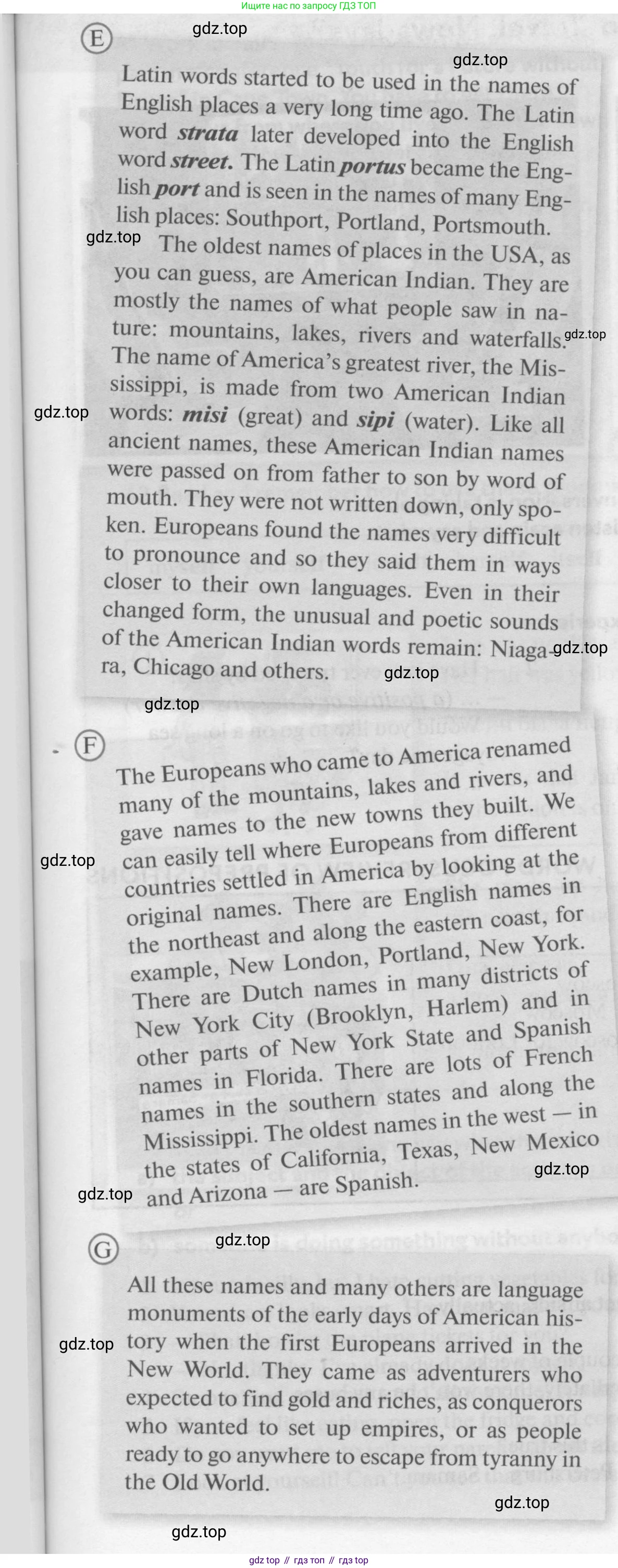Номер 32, страница 70 - гдз по английскому языку 9 класс (enjoy english) учебник Биболетова, Бабушис

Авторы: Биболетова М. З., Бабушис Е. Е., Кларк О. И., Морозова А. Н.
Тип: Student's book (Учебник)
Серия: enjoy english (английский с удовольствием)
Издательство: Просвещение, Аст-Астрель
Год издания: 2016 - 2025
Цвет обложки: бирюзовый, синий
ISBN: 978-5-17-090258-3, 978-5-271-47224-4
Популярные ГДЗ в 9 классе
Unit 2. It`s a big world! Start travelling now!. Section 1. Why do people travel? - номер 32, страница 70.
№32 (с. 70)
Условие. №32 (с. 70)
скриншот условия


32 Read the first passage of the text to see if you were right or wrong.
Where do the names of places come from?
A We do not know when men began to give names to the places they lived in and to the seas, rivers, lakes, and mountains around them. Very often they invented a name that described a place in a certain way, for example, Bear Mountain, White Lake or Big Canyon. The water in the Dead Sea is so salty that nothing can live in it so the reason for the name is clear. The water in the Black Sea is not black but blue. However, when the ancient Greeks looked to the east, they often saw dark storm clouds over the water, and so they named it the Black Sea.
The Pacific Ocean is known for its terrible storms. Yet, on the day when the Spanish explorer, Balboa, first saw it, the ocean was quiet in the bright sunlight, and so he called it the Pacific which means "peaceful".
B From the names of places we are often able to tell who the people in the past were. There are lots of towns and cities whose names end in -pol. We can be sure, even without reading history books, that the Greeks settled in certain places during ancient times and gave them their names with -polis which means "city" in Greek.
C There are also lots of places that have taken their names from famous people, such as Ekaterinburg, Washington etc. The process of name-giving is not just a thing of the past. It is still very much alive today and shows the main events in a country's history. For example, Bratsk speaks of young people of different nationalities who went to the wild taiga and founded a new town there.
D Sometimes elements of different languages influence the names of places. In the name of Shakespeare's birthplace, Stratford-upon-Avon, we see four words from three different languages. In this town, a Roman road (in Latin strata) crossed the Avon (in the Welsh language, the word afon means a river). The English word ford means a place where we can cross a river. So the name Stratford-upon-Avon means the place where the road crosses the river. From this we know that at different times, Roman, Welsh and English people lived here.
E Latin words started to be used in the names of English places a very long time ago. The Latin word strata later developed into the English word street. The Latin word portus became the English port and is seen in the names of many English places: Southport, Portland, Portsmouth.
The oldest names of places in the USA, as you can guess, are American Indian. They are mostly the names of what people saw in nature: mountains, lakes, rivers and waterfalls. The name of America's greatest river, the Mississippi, is made from two American Indian words: misi (great) and sipi (water). Like all ancient names, these American Indian names were passed on from father to son by word of mouth. They were not written down, only spoken. Europeans found the names very difficult to pronounce and so they said them in ways closer to their own languages. Even in their changed form, the unusual and poetic sounds of the American Indian words remain: Niagara, Chicago and others.
F The Europeans who came to America renamed many of the mountains, lakes and rivers, and gave names to the new towns they built. We can easily tell where Europeans from different countries settled in America by looking at their original names. There are English names in the northeast and along the eastern coast, for example, New London, Portland, New York. There are Dutch names in many districts of New York City (Brooklyn, Harlem) and other parts of New York State and Spanish names in Florida. There are lots of French names in the southern states and along the Mississippi. The oldest names in the western states of California, Texas, New Mexico and Arizona — are Spanish.
G All these names and many others are language monuments of the early days of American history when the first Europeans arrived in the New World. They came as adventurers who expected to find gold and riches, as conquerors who wanted to set up empires, or as people ready to go anywhere to escape from tyranny in the Old World.
Решение. №32 (с. 70)

Решение 2. №32 (с. 70)
Откуда происходят названия мест?
Ответ:
32. According to the text, the names of places come from several sources:
a) From descriptions of the place itself, its features, or even the weather, for example, Big Canyon, the Black Sea, or the Pacific Ocean.
b) From the people who settled there in the past; for example, cities with names ending in -polis indicate Greek settlements.
c) From famous people, like Washington, or historical events, like the founding of Bratsk.
d) From a combination of words from different languages that describe a place, such as Stratford-upon-Avon (from Latin, Welsh and English words).
e) From the languages of the original inhabitants, such as American Indian names like Mississippi.
f) From settlers who named new towns and areas after their places of origin, such as New London or New York.
---
32. Согласно тексту, названия мест происходят из нескольких источников:
а) Из описаний самого места, его особенностей или даже погоды, например, Большой Каньон, Черное море или Тихий океан.
б) От народов, которые поселились там в прошлом; например, города с названиями, оканчивающимися на -полис, указывают на греческие поселения.
в) От известных людей, как Вашингтон, или исторических событий, как основание Братска.
г) Из комбинации слов из разных языков, описывающих место, например, Стратфорд-на-Эйвоне (из латинских, валлийских и английских слов).
д) Из языков коренных жителей, например, индейских названий, таких как Миссисипи.
е) От поселенцев, которые называли новые города и территории в честь мест, откуда они родом, например, Нью-Лондон или Нью-Йорк.
Другие задания:
Помогло решение? Оставьте отзыв в комментариях ниже.
Присоединяйтесь к Телеграм-группе @top_gdz
ПрисоединитьсяМы подготовили для вас ответ c подробным объяснением домашего задания по английскому языку за 9 класс, для упражнения номер 32 расположенного на странице 70 к Учебник (Student's book) серии английский с удовольствием , enjoy english 2016 года издания для учащихся школ и гимназий.
Теперь на нашем сайте ГДЗ.ТОП вы всегда легко и бесплатно найдёте условие с правильным ответом на вопрос «Как решить ДЗ» и «Как сделать» задание по английскому языку к упражнению №32 (с. 70), авторов: Биболетова (Мерем Забатовна), Бабушис (Елена Евгеньевна), Кларк (Ольга Игоревна), Морозова (Алевтина Николаевна), учебного пособия издательства Просвещение, Аст-Астрель.















